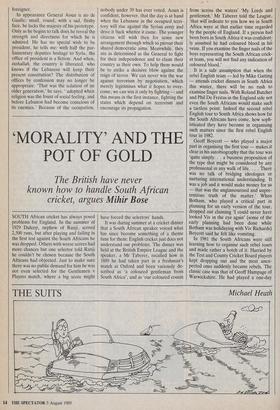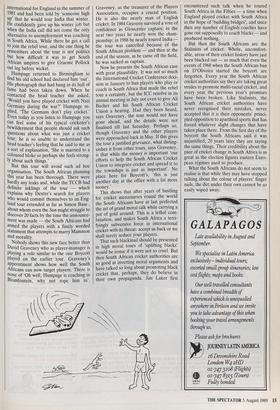`MORALITY' AND THE POT OF GOLD
The British have never known how to handle South African
cricket, argues Mihir Bose SOUTH African cricket has always posed problems for England. In the summer of 1929 Duleep, nephew of Ranji, scored 2,500 runs, but after playing and failing in the first test against the South Africans he was dropped. Others with worse scores had more chances but one selector told Ranji he couldn't be chosen because the South Africans had objected. Just to make sure there was no public demand for him he was not even selected for the Gentlemen v Players match, where a big score might have forced the selectors' hands.
It was during summer at a cricket dinner that a South African speaker voiced what has since become something of a theme tune for them: English cricket just does not understand our problems. The dinner was held at the British Empire League and the speaker, a Mr Taberer, recalled how in 1889 he had taken part in a freshman's match at Oxford and been variously de- scribed as 'a coloured gentleman from South Africa', and as 'our coloured cousin from 'across the waters' My Lords and gentlemen,' Mr Taberer told the League, `that will indicate to you how we in South Africa were at that earlier time regarded by the people of England. If a person had been born in South Africa it was confident: ly assumed he had coloured blood in his veins. If you examine the finger nails of the boys representing the South African crick- et team, you will not find any indication of coloured blood.'
It is a safe assumption that when the rebel English team — led by Mike Gatting — attends cricket dinners in South Africa this winter, there will be no rush to examine finger nails. With Roland Butcher and Phil De Freitas in the England side not even the South Africans would make such a tactless point. Indeed the second rebel English tour to South Africa shows how far the South Africans have come, how soph- isticated they have become in organising such matters since the first rebel English tour in 1982.
Geoff Boycott — who played a major part in organising the first tour — makes it clear in his autobiography that the tour was `quite simply. . . a business proposition of the type that might be considered by any professional in any walk of life. . . . There was no talk of bridging ideologies or nurturing international understanding. It was a job and it would make money for us — that was the unglamourised and unpre- tentious truth of the matter.' When Botham, who played a critical part in planning for an early version of the tour, dropped out claiming 'I could never have looked Viv in the eye again' (some of the early planning had been done while Botham was holidaying with Viv Richards) Boycott said he felt like vomiting.
In 1981 the South Africans were still learning how to organise such rebel tours and made rather a botch of it. Harried by the Test and County Cricket Board players kept dropping out and the most unex- pected ones suddenly became rebels. The classic case was that of Geoff Humpage of Warwickshire. He had played a .one-day
international for England in the summer of 1981 and had been told by 'someone high up' that he would tour India that winter. He confidently gave up his winter job but when the India call did not come the only alternative to unemployment was coaching in South Africa. While there he got a call to join the rebel tour, and the one thing he remembers about the tour is not politics but how difficult it was to get South African umpires to give Graeme Pollock out leg before wicket.
Humpage returned to Birmingham to find his old school had declared him 'out'. His photograph that had hung in its hall of fame had been taken down. When he contacted the head teacher she asked, `Would you have played cricket with Nazi Germany during the war?' Humpage re- plied, 'The Germans don't play cricket.' Even today as you listen to Humpage you can feel some of his typical cricketer's bewilderment that people should ask such questions about what was just a cricket tour; he is so unable to understand the head teacher's feeling that he said to me as a sort of explanation, 'She is married to a coloured bloke so perhaps she feels strong- ly about such things.'
But this tour will avoid such ad hoc organisation. The South African planning this year has been thorough. There were hardly any leaks and, while the TCCB had definite inklings of the tour — which explains why Dexter's search for players who would commit themselves to an Eng- land tour extended as far as Simon Base , about whom even the Sun might struggle to discover 20 facts by the time the announce- ment was made — the South Africans had armed the players with a finely worded statement that attempts to marry Mammon and morality.
Nobody shows this new face better than David Graveney who as player-manager is Playing a role similar to the one Boycott Played on the earlier tour. Graveney's appointment shows how well the South Africans can now target players. There is none of 'Oh well, Humpage is coaching in Blomfontein, why not rope him in'. Graveney, as the treasurer of the Players Association, occupies a crucial position. He is also the nearly man of English cricket. In 1984 Graveny survived a vote of confidence as Gloucester captain; in the next two years he nearly won the cham- pionship; in 1988 he nearly toured India the tour was cancelled because of the South African problem — and then at the end of the season, as he came off the field, he was sacked as captain.
Now he presents the South African case with great plausibility. It was not so much the International Cricket Conference deci- sion in January to ban players who play or coach in South Africa that made the rebel tour a certainty, but the ICC resolve in its annual meeting in July not even to give Ali Bacher and his South African Cricket Union a hearing. Had they been heard, says Graveney, the tour would not have gone ahead, and the details were not finalised till last Saturday. Perhaps so, though Graveney and the other players were approached back in May. If this gives the tour a justified grievance, what disting- uishes it from other tours, says Graveney, is that while the money is important 'our efforts to help the South African Cricket Union to integrate cricket and spread it to the townships is just as important'. No place here for Boycott's, 'this is just another day at the office with a lot more money.' This shows that after years of hustling for cricket mercenaries round the world the South Africans have at last perfected the art of grand moral talk while carrying a pot of gold around. This is a lethal com- bination, and makes South Africa a terri- fyingly subversive force in international cricket with its threat: accept us back or we shall surely seduce your players. That such blackmail should be presented in high moral tones of 'uplifting blacks' would be ironic if it were not so cruel. But then South African cricket authorities are so good at inverting moral arguments and have talked so long about promoting black cricket that, perhaps, they do believe in their own propaganda. Jim Laker first
encountered such talk when he toured South Africa. in the Fifties — a time when England played cricket with South Africa in the hope of 'building bridge's', and since then any number of English coaches have gone out supposedly to coach blacks — and produced nothing.
But then the South Africans are the Stalinists of cricket. Whole, uncomfort- able, areas of their cricket history have just been blacked out — so much that even the events of 1968 when the South African ban on D'Oliveira started the boycott are forgotten. Every year the South African cricket authorities say they are taking great strides to promote multi-racial cricket, and every year the previous year's promises have been broken. Like Stalinists, the South African cricket authorities have never recognised their mistakes, never accepted that it is their opponents' princi7 pled opposition to apartheid sports that has forced whatever slight changes that have taken place there. From the first day of the boycott the South Africans said it was unjustified; 20 years later they are saying the same things. Their credibility about the pace of cricket change in South Africa is as great as the election figures eastern Euro- pean regimes used to produce.
What the South Africans do not seem to realise is that while they may have stopped talking about the colour of players' finger nails, the dirt under their own cannot be so easily wiped away.



















































 Previous page
Previous page